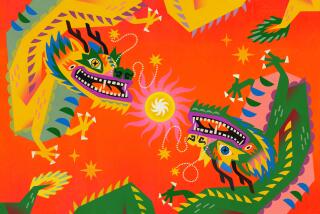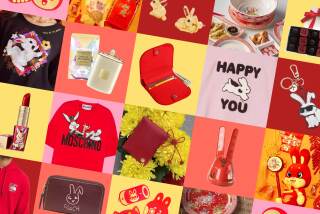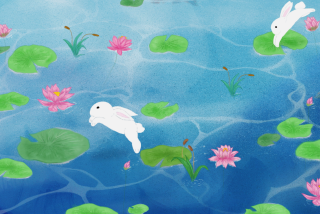Playboy Wishes Chinese Readers ‘Year New Happy’
- Share via
It was, everyone would agree, a clever idea the folks at Playboy magazine cooked up. The Chinese New Year, which began Jan. 29, is the Year of the Rabbit. And the Playboy symbol, after all, is none other than a debonair hare.
So the magazine seized on a way to make points with Chinese readers by linking the bunnies. They got a translator to compose a New Year’s greeting in Chinese, and placed full-page newspaper ads in Los Angeles and New York last Wednesday.
The intended message: “Best wishes for a happy New Year.” The Chinese letters, running top to bottom, led to a Playboy rabbit symbol and the English words “The Year of the Rabbit.” Only--according to several readers who contacted The Times, a Chinese writer and a Chinese-English dictionary--the translator has a severe spelling problem. The four Chinese characters appeared in the wrong order, garbling the greeting. “No language in the world reads from the bottom to the top,” observed one reader.
Clearly, Playboy officials aren’t delighted that their promotion sparked a few chortles among the public. “I don’t see it as a screw-up, per se, “ said assistant publisher J. P. Dolman Jr. “I suppose you could, but it depends on who you talk to.”
Dolman maintained that the ad was technically correct, because Chinese allows for flexibility in the order of the characters. Nonetheless, the magazine reversed their order in time for Friday’s appearance in the Chicago Tribune.
“We’ve gotten a number of calls here,” Dolman added. “Most of them have been, ‘Gee, thanks for recognizing the Chinese New Year.’ Some said it might look better the other way around, but nobody was irate or made a big deal about it.”
In fact, the whole affair may have boomeranged to Playboy’s benefit. According to Stephen Chang, a reporter in Los Angeles for the Chinese Daily News, the faux pas has resulted in extra attention to the ad in the Chinese community.
“For commercial purposes, that is very successful,” said Chang, who declared that the spelling was definitely wrong. “It should be done very formally. It always should be in order. That’s why we heard of it (the mistake).”
Chang, a Chinese-American, said he assumed the blunder occurred in the magazine’s production process, just as similar mistakes sometimes happen when Chinese-language publications attempt to use English words: “People just react that it’s funny. It’s very excusable for typesetters who don’t read Chinese.”
A spokeswoman for Playboy Enterprises said that out of about 60 calls received by the magazine, almost almost all of them were complimentary. “It was just one of those things,” she sighed. “We did it for fun. And Chinese translators are hard to find these days.”


